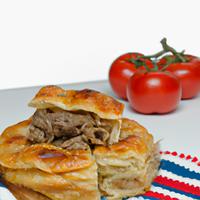
1 serving (150 grams) contains 350 calories, 15.0 grams of protein, 20.0 grams of fat, and 35.0 grams of carbohydrates.

Log this food in SnapCalorie

Nutrition Information
Calories |
555.6 | ||
|---|---|---|---|
% Daily Value* |
|||
| Total Fat | 31.7 g | 40% | |
| Saturated Fat | 12.7 g | 63% | |
| Polyunsaturated Fat | 0 g | ||
| Cholesterol | 63.5 mg | 21% | |
| Sodium | 793.7 mg | 34% | |
| Total Carbohydrates | 55.6 g | 20% | |
| Dietary Fiber | 3.2 g | 11% | |
| Sugars | 3.2 g | ||
| protein | 23.8 g | 47% | |
| Vitamin D | 0 mcg | 0% | |
| Calcium | 79.4 mg | 6% | |
| Iron | 3.2 mg | 17% | |
| Potassium | 317.5 mg | 6% | |
* Percent Daily Values are based on a 2,000 calorie diet. Your daily values may be higher or lower depending on your calorie needs.
Food Attributes
Source of Calories
About Meat burek
Meat Burek is a savory pastry originating from the Balkans and popular across Eastern European and Middle Eastern cuisines. Traditionally made with thin, flaky filo dough, it is filled with minced meat, typically beef or lamb, seasoned with onions, salt, and pepper. The layers are rolled or folded into spirals or pies before being baked to golden perfection. Packed with protein from the meat, Burek can offer energy and satiety, making it a filling meal or snack. However, it is often high in fats due to the use of butter or oil in the dough and filling. The dish may also contain refined carbohydrates from the pastry, which can be less nutrient-dense. While delicious and comforting, moderation is key when enjoying Meat Burek to balance its indulgent qualities with overall dietary health.



